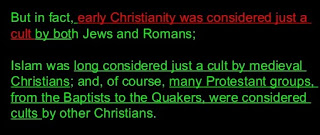I was a True Follower of Jesus

By Carl S ~ G o into a Christian church parking lot any Sunday during service. You're likely to see a few expensive cars there. (My wife informs me two males, who most likely chant, “in God we trust,” wear their guns to services.) Are expensive car and/or, gun owners true followers of Jesus? Do those married males look with lust at other women, even as they sing “I have decided to follow Jesus?” Ditto. Nope, the majority of believers are “following” the party line of their particular church, and if it doesn't fit them, they change churches. Each church leader has to not only attract new customers, but even more, hang on to the ones he or she has. Tread cautiously lest they walk away, seems to be the policy. Jesus of the gospels wasn't that way. Take it or leave it, he would say; toughen up, the way ahead is narrow and your life is cheap compared to your soul's future. If you own everything, it isn't worth it if you lose that soul. So, just who is Jesus? Why, h...
















